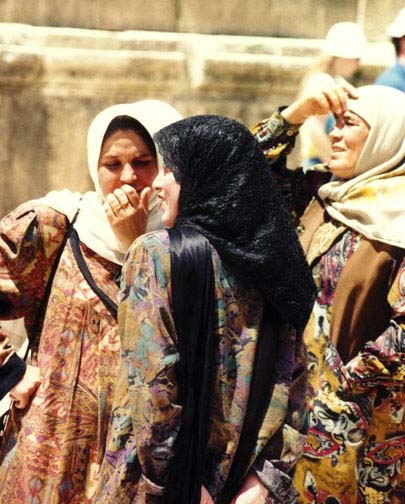
Peace Corps volunteers answer call to duty in Jordan
Peace Corps volunteers answer call to duty in Jordan
By Yacoub Abu Ghosh
AMMAN — A call to duty had been issued.
“Ask not what your country can do for you, ask what you can do for your country,” with these words, the late US President John F. Kennedy opened a new chapter in the general attitude of the American people, and until this day, his call is being answered.
As a manifestation of JFK's vision, the US Peace Corps was established back in March 1961; a US government organisation with the mission of providing American volunteers who contribute to the social and economic development of interested countries, promote a better understanding of Americans among the people whom volunteers serve, and strengthen Americans' understanding of the world and its peoples.
Since the organisation's establishment to date, more than 150,000 Peace Corps volunteers have served in the development of education, environment, health, business and agriculture sectors in 134 countries around the world, dealing directly with the peoples of those countries, and often living in rural and undeveloped environments to be in the areas that need help most.
Peace Corps volunteers have served in eight Arab countries including Morocco, Tunisia, Mauritania, Yemen, Bahrain, Oman, and most recently, Jordan, in which the Peace Corps presence is only three years old.
At the invitation of the Jordanian government, the first Peace Corps volunteers to begin their two years of service in Jordan arrived in May 1997.
Country director of the Peace Corps in Jordan, Jack Seeger, explained to the Jordan Times the course the volunteers go through starting with their arrival in the Kingdom.
“Before their deployment to rural and provincial communities in which they provide their services, the volunteers undergo a 12-month intensive training course in Arabic and in certain skills they may need in their service, such as the special technical training for teaching English language to Arabic speakers. They also teach volunteers how to adapt to and blend in with the new environment of which they are about to become a part.”
Seeger added that the training course takes place in the Madaba area, where volunteers stay with local families. Volunteers who are with the English teaching programme train in a local Madaba school, after which they are deployed to the villages and different provincial communities in which they live for the rest of their two-year service.
The majority of the 63 volunteers currently serving in Jordan work in the English teaching programme. In collaboration with the Ministry of Education, they work hand-in-hand with Jordanian teachers in secondary schools in rural areas in an effort to develop English language standards with both teachers and students.
The rest of the volunteers work in collaboration with the Ministry of Social Development, in projects such as working with Jordanian women's groups to promote economic opportunities within their communities through the development of small-scale income-generating projects. They also work on environmental projects in collaboration with the Royal Society for the Conversation of Nature, several other NGO's, and on projects in the health and agriculture sectors.
Most recently, the Peace Corps volunteers are trying to contribute to the IT sector, where volunteers are teaching Jordanian teachers in some areas on computer use.
“The Peace Corps have recently started collaborating with the Ministry of Youth, to enable volunteers to work in youth centres around the country training youth in the use of computers in addition to other fields in which they can help,” Seeger told the Jordan Times.
To enable volunteers to do their jobs as efficiently as possible, they are expected to establish the maximum amount of communication possible with individuals in the communities in which they serve.
To achieve that, they are trained to blend into those communities by observing and learning the ways and traditions of the people.
“During training, we inform volunteers to observe and learn about the cultures they are dealing with. We also go to the villages and try to prepare the local residents for receiving them,” the country director said.
Thomas Sabol is a Peace Corps volunteer living in Sweileh and working with the RSCN. As a trained wildlife biologist, Sabol conducts research in Jordanian nature reserves such as Azraq and Wadi Mujib.
“I've helped set up a monitoring programme to keep track of all living and non-living things such as rocks in the wildlife reserves,” Sabol explained, adding that he is particularly proud of an animal holding facility that he built. The facility is used to contain wild animals that are confiscated from pet shops who obtained them illegally, in addition to sick animals from the reserves awaiting treatment.
Another volunteer who lives in a little village near Petra told the Jordan Times that she teaches English to 8th and 9th grade students at the Petra School for Girls.
Karey Trenda said that she is currently using the school to work on a summer economic project for the women of her village making traditional bedouin handicrafts.
The third goal of Peace Corps is to strengthen Americans' understanding about the world and its peoples.
Seeger talked about the influence returned Peace Corps volunteers have on the American society in teaching more about the peoples of the rest of the world.
“When volunteers return to their homes in the US, it is safe to say that they become permanent ambassadors of the countries they served in, teaching the people in their communities about those countries and the experiences they went through during their service,” Seeger said, adding that there are former Peace Corps volunteers in the US Congress.
Seeger added that 51 new volunteers are expected to arrive in Jordan by the end of July to start training in preparation for their service.
